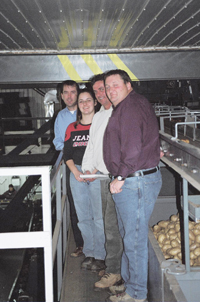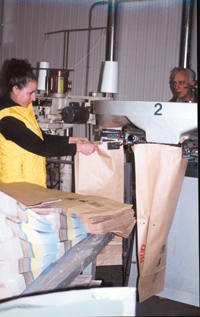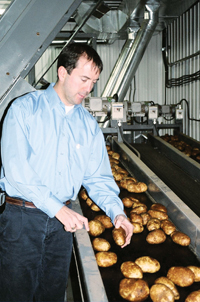
Features
Production
Research
New grading system helps P.E.I. farm pick the perfect potato
helps P.E.I. farm pick the perfect potato
March 27, 2008 By Kathy Birt
W.P. Griffin Inc., a Prince Edward
Island potato operation growing a total of 1,100 acres of potatoes, is
leading the nation’s industry in high-tech grading.
 |
| Up here on one of the catwalks, these top management people at W.P. Griffin Inc. in Elmsdale, P.E.I., get a good look at the potato grading operation below. From left: John Griffin, president; Tina Gaudet, who is responsible for product development, calibration on equipment and farm food safety; Peter Griffin, operations manager; and Garth Smallman, who is responsible for sales and marketing. Photos by Kathy Birt |
 |
| The potato bagging machine at work. |
W.P. Griffin Inc., a Prince Edward Island potato operation growing a total of 1,100 acres of potatoes, is leading the nation’s industry in high-tech grading.
The company recently installed a state-of-the-art Newtec RV 12 optical grading system, manufactured in Denmark, which has a dual sorting system, offering sorting and sizing features that allow potatoes to be graded automatically. It is the latest technology to be installed at the W.P. Griffin potato farm and packaging operation.
John Griffin, company president and general manager, says the Newtec RV 12 grading system is the first of its kind to be installed in North America.
The new optical grader is designed to take the spuds under bright lights where a video camera records any imperfections (i.e. green, grey or black spots).
“Those potatoes would be discarded according to the parameters we set,” on the computer system, he explains.
The grading system also offers programming parameters for different potato varieties, says John, adding “the preset grading filters that came with the machine did not include a Russet Burbank program. So in order to program (the parameters for Russet), there is specific software that is planned for in the near future.”
John says a major renovation and upgrade to the packaging/washing plant, which saw the complete gutting and reorganizing of the entire 25,000-square-foot facility, puts this fresh potato packer in the forefront of the industry. “We have complete food safety, quality assurance and traceability features in place in our all equipment,” he says.
He says the cornerstones of the operation are the Volm bagger, a Hagen sizer and 12 potato hoppers.
Using a carousel system, the Volm bagger is capable of bagging paper bags from five pounds to 50 pounds. Then, with the flip of a switch, it can weigh, fill, close and mark the lot number on poly potato bags from three to 20 pounds.
The Hagen sizer has the capability of creating food service count boxes. Simply put, it can sort five- to 14-ounce potatoes individually and place them in the proper containers (60, 70, 80 count boxes, etc.). With customized features on the Hagen, W.P. Griffin Inc. staff can “cherry-pick” the best potatoes for the company’s microwave-ready specialty packs.
 |
| John Griffin, president and general manger of W.P. Griffin, Inc. of Elmsdale, P.E.I., checks out some of the spuds passing on the conveyor belt in their 25,000-square-foot warehouse. Photo by Kathy Birt |
In 2004, the company was the first potato packer in Canada to market single shrink-wrapped, microwave-ready potatoes. They also market three baking potato tray packs, five-pound mesh restaurant-style baking potatoes and two-pound poly baby potatoes in Sobeys stores across Canada. “Our company was also the first in Canada to develop a packing partnership with Dole Fresh Fruit & Vegetable Co.,” adds John.
Presently, the company packs under the brand names Dole, Griffin, Bud the Spud and various private labels.
Receiving an excellent rating from the American Institute of Baking in 2005 is another feather in the cap for this ambitious operation. “Food safety is becoming a requirement and is more stringent now then it ever was in the past for the potato industry,” says John. As part of the company’s commitment to food safety and quality, Griffin packages contain cooking information. This way, the consumer can be better informed on the applications certain potatoes are recommended for and can ultimately make the best meal choice.
“We have a one to five star cooking symbol on all our potato packaging with cooking instructions according to the potato variety,” explains John.
The company, which began with Wilfred Griffin in 1947, also cultivates 950 acres of grain crops, 650 acres of hay and raises 350 head of beef cattle.
 |
| The inside of the Newtec RV 12 optical grading system at W.P. Griffin’s warehouse in Elmsdale, P.E.I. Here each potato is photographed up to 40 times. Photo by Kathy Birt |
John’s brother, Peter, the self-described “hands-on” part of the operation, refers to his father as a pioneer in the farming industry. “Back then, the train came through by the packing shed, so we were in the business of shipping potatoes,” says Peter, who also serves as the company’s vice-president and operations manager.
They shipped potatoes mostly to Toronto and Montreal in those early days. Now W.P. Griffin Inc. services the Canadian domestic market and ships internationally, maintaining up to 50 employees during peak season.
Teamwork is key to the operation and may be what keeps this farm thriving after 58 years. Management offers a General Education Diploma program in house to help employees finish their education. Longtime employees are also awarded for their service to the company. Griffin recently recognized three longtime employees: Wayne Dunn, 40 years; Charles Dunn, 40 years, and Clarence Keefe, 35 years.
Worker strengths and experiences are also taken into consideration. Griffin employee Christina Gaudet, a Bachelor of Science graduate, works closely with the P.E.I. Food Technology Centre on issues such as product development and food safety. “I am given the opportunity to attend various food production and development conferences and seminars,” explains Gaudet, adding, “It’s a great place to work with so many new developments here and within the food industry (as a whole).”
With John’s business degree and Peter’s hands-on approach to farming, “I think we make a pretty good team,” says Peter, who came right out of high school to work on the farm “He’s got the education and I’ve got the practical. I’m out there on the farm front working out problems and glitches. I’m all over the place,”
After all, he adds, “Getting your hands in the dirt is the only way to farm.”
Print this page